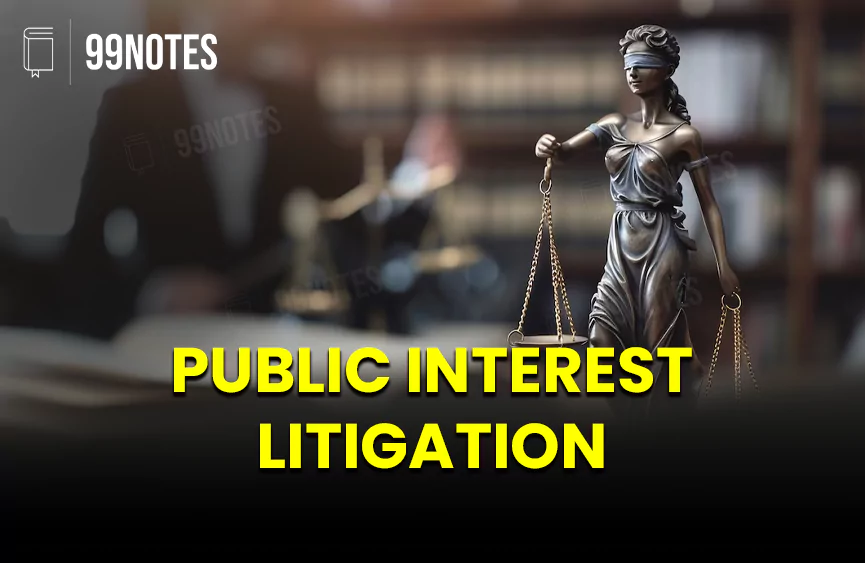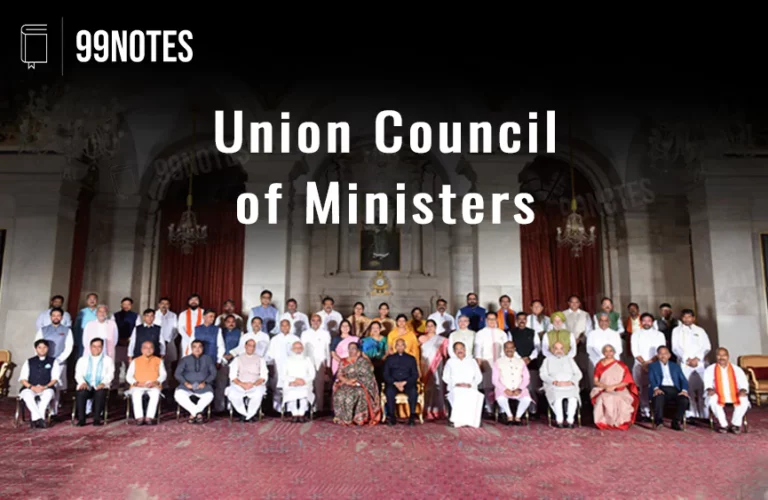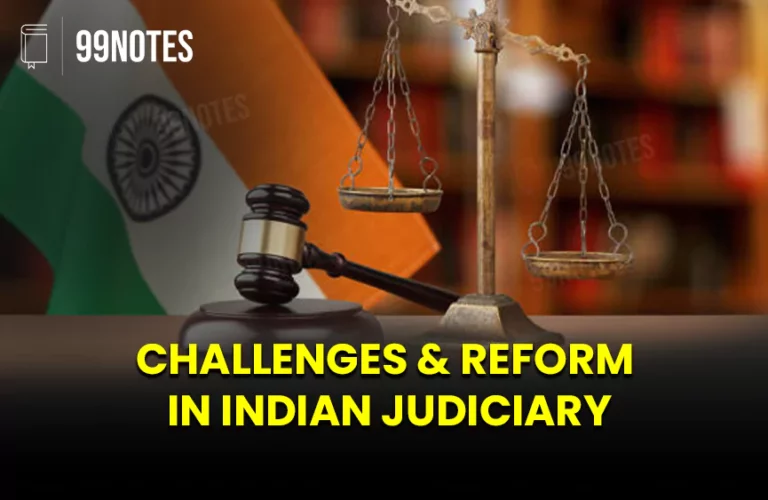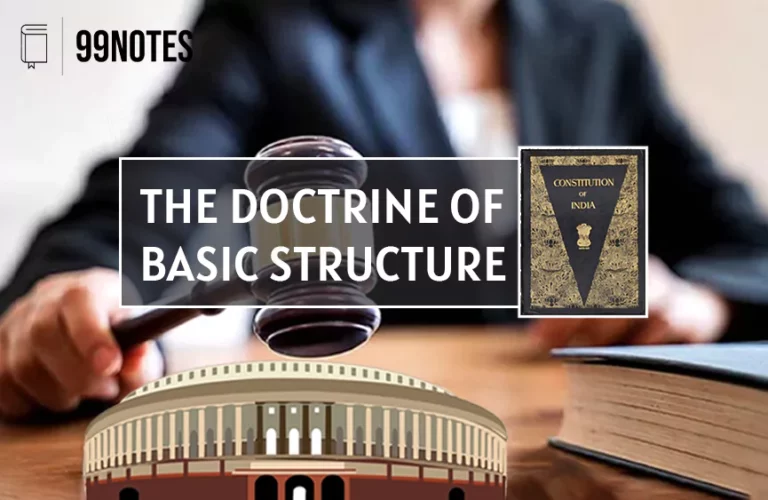PIL (Public Interest Litigation)
Public interest litigation(PIL) is a case or petition filed before a court to protect, safeguard or enforce public interest. PIL is a judicial innovation for the protection of the disadvantaged section, like the poor, minorities, etc., and their interests. PIL is also known as Social Action litigation, Social action litigation, etc
Genesis of the PIL
Justice P.N. Bhagawati heralded the PIL movement in the S.P. Gupta vs. Union of India case.In this case, the Supreme Court relaxed the traditional rule of the ‘locus standi.’
| What is locus standi As per the doctrine of locus standi, a person who is not related to a disputed matter is not allowed to interfere in the judicial proceedings. Only an aggrieved person whose legal right has been violated is allowed to bring an action in the Court. |
| The benefit of the relaxation of the ‘locus standi’ It gave the public-spirited citizens and social organisations the scope to approach the judiciary on behalf of the disadvantaged section to protect their rights. |
Difference between Writ Petition and PIL
Writs are filed by aggrieved individuals on their behalf to seek legal action against violation of fundamental rights, whereas PIL is filed for the public interest.
A Public Interest Litigation (PIL) is an extension of the writ petition, so PIL cases are all writ petitions. In a writ petition, locus standi is followed, whereas in PIL, the locus standi is diluted.
Features of the PIL:
- It increases the accessibility of justice to the poor people who are in the lower rung of society.
- It is different from traditional litigation in which there are two disputing parties.
- It helps the judiciary to monitor institutions like prisons, protective homes, asylums, etc.
- It is not only for a particular individual but for the public interest.
- It highlights various issues in society and helps in promoting political and social change in India.
- A PIL can only be filed against the Central Government, municipal governments or State Government and not against individuals.
A few cases of PIL:
Rural Litigation Entitlement Kendra (RLEK) VS UOI: in this case, the Supreme Court, addressing the issue of unauthorised and illegal limestone mining activities in the Mussoorie Hills range, gave judgement to stop the mining in a phased manner.
Parmanand Katara vs UOI: In this case, the Supreme Court said that a doctor has a professional obligation to extend his/her services with the expertise to protect life. In this case judiciary held that it does not matter whether a doctor is working at a government hospital or otherwise,
Hussainara Khatoon v. State of Bihar: TheCourt was drawn to the incredible situation of undertrials in Bihar who had been detained for periods far in excess of the maximum sentence for the offences they were charged with. The Court proceeded to recognise the right to a speedy trial. It also passed the order of general release of close to 40,000 undertrials who had undergone detention beyond such a maximum period.
Advantages of the PIL:
- Promotes progressive social legislation: With PIL, the Supreme Court has used its jurisdiction to promote the socio-economic interest of specific groups like bonded labour, mentally challenged, etc
- Effective access to justice: Poor and illiterate people can get justice through PIL as they cannot afford and don’t know the legal system.
- Promoting the rule of law: The Judiciary can make the executive more accountable by ordering it to perform its duties and maintain the rule of law. It keeps the administrative system more accountable.
- Realisation of the fundamental rights: The Court can promote the value of the fundamental rights of the citizen. Thus, trust in the constitution and democratic system will be enhanced.
Issues with the Public Interest Litigation:
- PIL filed for Publicity: There are instances of using PIL as a tool to garner publicity. Sometimes, it becomes a tool for political and private interests.
- For example, a PIL was filed against the Kedarnath movie on a charge of hurting religious sentiments. However, it was dismissed by it, calling it a “publicity stunt”.
- PIL as a political tool: The attempt by the judiciary through PILs to enter the area of policy making and policy implementation has caused concern in political circles.
- Wastage of court time: PIL cases were being given priority over other cases; thus, when a PIL is filed based on a vested interest, it leads to a waste of the judiciary’s time. This leads to an excess burden on the judiciary.
- Backlogs in the judiciary: It leads to the overburdening of the Court with the thoughtless PILs by parties with private interests. Today, the PIL is no longer only limited to the problem of the poor and oppressed.
- Lack of implementation: there is criticism that the judiciary while entertaining PIL, is overstepping the boundaries of its jurisdiction. However, the judiciary is unable to supervise the effective implementation of its orders.
- Issues with flexibility: There is a lack of uniformity in the entertaining of the PIL. In some cases, it has shown reluctance to entertain the PIL, whereas, in others, it has formulated a policy for entertaining the PIL.
Guidelines for the filing PIL:
Supreme Court has issued eight directions in its Balwant Singh Chaupal judgment to help constitutional courts separate genuine PIL petitions from the barmy ones:
(1) The courts must encourage genuine and bonafide PIL and discourage and curb the PIL filed for political reasons;
(2) It would be more appropriate for each High Court to make rules for encouraging the genuine petition and discouraging the PIL filed with oblique motives.
(3) The courts should first verify the credentials of the petitioner before entertaining a PIL;
(4) The Court should verify the correctness of the contents of the petition before taking a PIL;
(5) The Court should be fully certain that the public interest is involved in the PIL before entertaining the petition;
(6) The Court should ensure that the PIL that involves larger public interest should be given priority over other petitions;
(7) Before entertaining the PIL, the Court should ensure that there is no personal gain or private motive behind filing the public interest litigation;
(8) The Court should impose exemplary costs to curb frivolous petitions. It will also discourage the PIL filed with extraneous and ulterior motives
Further, the Supreme Court has highlighted the following areas in which PIL can be filed:
- Bonded Labour matters.
- When minimum wages for workers are not paid, casual workers are exploited. It can also be filed in case of complaints of violation of Labour Laws.
- Neglected Children.
- Petition against harassment in jails
- Release after having completed 14 years in jail, death in jail, transfer, release on personal bond, and speedy trial is a fundamental right.
- Petitions against atrocities on women, in particular harassment of bride, bride-burning, rape, murder, kidnapping etc.
- Petitions against police for refusing to file a case, harassment by police and death in police custody.
- Petitions complaining of torture or harassment of villagers by police or co-workers from persons belonging to Scheduled Caste(SC) and Scheduled Tribes(ST) and economically backward classes(EBC).
- Petitions related to environmental pollution, disturbance of ecological balance, maintenance of heritage and culture, drugs, food adulteration, antiques, forest and wildlife and other matters of public importance.
- Petitions from riot -victims.
- Family Pension.
Cases that come under the following categories will not be entertained as PIL, and these may be returned to the petitioners:
- Cases related to Landlord-tenant matters
- Cases pertaining to the Service matters
- Matters related to gratuity and pension
- Complaints against Central and State government departments and Local Bodies except relating to items mentioned in the list of guidelines
- Petition related to Admission to educational institutions, i.e. medical and other institutes.
- Petitions for early hearing of cases that are pending in the High Court or subordinate courts
PIL is a judicial adventure for the justice delivery to the poor and illiterate section of society. However, there is a need to promote the genuine PIL so that the public interest is served for the welfare of the people.




![Salient Features Of Indian Constitution [Upsc Notes] | Updated March 2, 2026 Salient Features Of Indian Constitution [Upsc Notes]](https://99notes.in/wp-content/uploads/2023/08/salient-features-of-indian-constitution-banner-99notes-upsc-654cce9bf3d76.webp)

